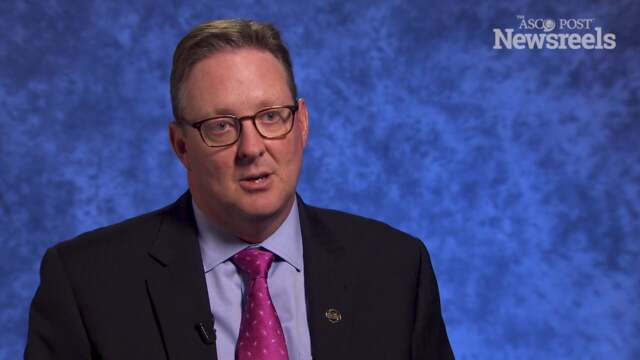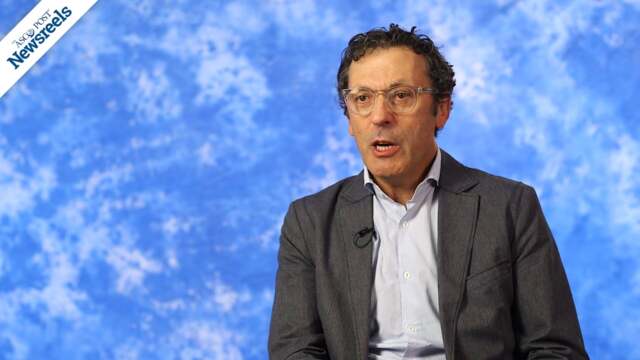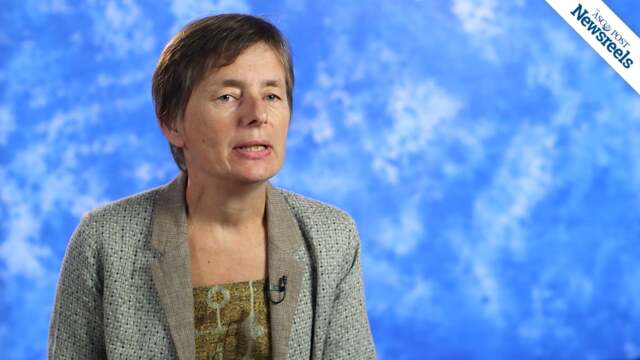Addition of EGFR Tyrosine Kinase Inhibitor to Chemotherapy in Resistant Non–Small Cell Lung Cancer
As reported by Mok et al in the Journal of Clinical Oncology, overall survival analysis of the phase III IMPRESS trial indicated a poorer outcome when adding gefitinib (Iressa) vs placebo to chemotherapy after disease progression on first-line gefitinib in epidermal growth factor receptor...
Results From the Phase III JUNIPER Trial Evaluating Abemaciclib in KRAS-Mutated, Advanced NSCLC
On October 10, Eli Lilly and Company announced that its phase III JUNIPER study evaluating abemaciclib (Verzenio), a cyclin-dependent kinase (CDK) 4 and CDK6 inhibitor, as monotherapy in KRAS-mutated, advanced non–small lung cancer (NSCLC) did not meet its primary endpoint of overall...
Osimertinib Granted Breakthrough Therapy Designation for First-Line Treatment of EGFR Mutation–Positive NSCLC
On October 9, AstraZeneca announced that the U.S. Food and Drug Administration (FDA) granted Breakthrough Therapy designation for osimertinib (Tagrisso) for the first-line treatment of patients with metastatic epidermal growth factor receptor (EGFR) mutation–positive non–small cell lung ...
Immune-Related Adverse Events and Outcomes With Immunotherapy for NSCLC
In a Japanese analysis reported in JAMA Oncology, Haratani et al found that development of immune-related adverse events was associated with improved survival among patients receiving nivolumab (Opdivo) for advanced or recurrent non–small cell lung cancer (NSCLC). Study Details The study...
Expert Point of View: Paul Baas, MD, PhD
INVITED DISCUSSANT Paul Baas, MD, PhD, of The Netherlands Cancer Institute, called the MAPS2 trial an “excellent example of how studies in mesothelioma should be run.” As Dr. Baas pointed out, both arms performed well as second- and third-line treatment, with median progression-free survival with ...
Relapsed Mesothelioma Controlled by Checkpoint Inhibition
IN PATIENTS with malignant pleural mesothelioma, combination immunotherapy with two checkpoint inhibitors in the second or third line of treatment extended survival to at least 15 months in the MAPS2 trial,1 sponsored by the Intergroupe Francophone de Cancérologie Thoracique (IFCT) and reported at ...
‘Clinically Meaningful’ Results With First-Line Osimertinib in EGFR–Positive NSCLC
OSIMERTINIB (TAGRISSO) showed encouraging results as first-line therapy for patients with epidermal growth factor receptor (EGFR)–mutated non–small-cell lung cancer (NSCLC) in the phase III FLAURA trial, according to results presented at the 2017 European Society for Medical Oncology (ESMO)...
Expert Point of View: Tony Mok, MD, FASCO
“IN 2008, I presented the IPASS results. FLAURA has beaten me to the ground. The results exceeded expectations, and FLAURA is undoubtedly a positive study,” stated formal discussant Professor Tony Mok, MD, FASCO, Chair of Department of Clinical Oncology, the Chinese University of Hong Kong. “It is ...
‘Clinically Meaningful’ Results With First-Line Osimertinib in EGFR–Positive NSCLC
OSIMERTINIB (TAGRISSO) showed encouraging results as first-line therapy for patients with epidermal growth factor receptor (EGFR)–mutated non–small-cell lung cancer (NSCLC) in the phase III FLAURA trial, according to results presented at the 2017 European Society for Medical Oncology (ESMO)...
Comparison of First-Line Treatments for EGFR-Mutant NSCLC
The phase III ARCHER 1050 trial has shown superior progression-free survival with the second-generation irreversible epidermal growth factor receptor (EGFR) tyrosine kinase inhibitor dacomitinib vs gefitinib (Iressa) in the first-line treatment of advanced EGFR-mutant non–small cell lung...
Consolidative Radiotherapy for Limited Metastatic NSCLC
In a single-institution phase II trial reported in JAMA Oncology, Iyengar et al found that consolidative stereotactic ablative radiotherapy improved progression-free survival vs maintenance therapy alone in patients with limited metastatic non–small cell lung cancer (NSCLC). Study Details...
Combination Therapy for Previously Untreated BRAF V600E–Mutant Metastatic NSCLC
In a phase II trial, the combination of dabrafenib (Tafinlar) plus trametinib (Mekinist) produced durable responses in a cohort of patients with previously untreated BRAF V600E–mutant metastatic non–small cell lung cancer (NSCLC). The findings were reported in The Lancet Oncology by...
Shrinivas Rathod, MD, on NSCLC: Quality-of-Life Outcomes From an IAEA Trial
Shrinivas Rathod, MD, of the University of Manitoba, discusses phase III study results on optimization of treatment of advanced non–small cell lung cancer using radiation therapy and chemotherapy (Abstract 223).
Maria Werner-Wasik, MD, on Lung Cancer Highlights: Expert Perspective
Maria Werner-Wasik, MD, of Thomas Jefferson University Hospital, summarizes a session on NSCLC that included discussion of a quality-of-life trial on optimizing treatment; chemotherapy and radiotherapy in advanced disease; a comparison of standard- vs high-dose conformal chemoradiotherapy; and long-term results on a comparison of two stereotactic body radiation therapy schedules in inoperable stage I disease (Abstracts 223, 224, 227, 33).
Jeffrey D. Bradley, MD, on NSCLC: Results of the RTOG 0617 Trial
Jeffrey D. Bradley, MD, of Washington University School of Medicine, discusses long-term phase III findings on standard-dose vs high-dose conformal chemoradiation therapy with or without cetuximab for stage III non–small cell lung cancer (Abstract 227).
ASTRO 2017: RTOG 0617: Long-Term Survival Rates Improve Previous Estimates for Locally Advanced Lung Cancer
Long-term results of a phase III clinical trial indicate that survival rates for patients receiving chemoradiation for unresectable, locally advanced non–small cell lung cancer (NSCLC) may be more than twice as high as previous estimates. At 5 years following treatment with a standard dose of ...
MicroRNA-Loaded Minicells in Recurrent Malignant Pleural Mesothelioma
An Australian phase I first-in-human trial has shown early activity of microRNA-loaded minicells in patients with malignant pleural mesothelioma. These findings were reported in The Lancet Oncology by van Zandwijk et al. The minicells (TargomiRs) are loaded with miR-16–based mimic microRNA...
ASTRO 2017: Adding Radiation to Maintenance Chemotherapy May Benefit Patients With Limited Metastatic NSCLC
For patients with limited metastatic non–small cell lung cancer (NSCLC), adding radiation therapy before maintenance chemotherapy may curb disease progression when compared to maintenance chemotherapy alone, according to a randomized phase II clinical trial reported by Iyengar et al. at the...
Addition of Motesanib to Paclitaxel/Carboplatin in East Asian Patients With Advanced NSCLC
The phase III MONET-A trial has shown that the addition of the multikinase/vascular endothelial growth factor receptor inhibitor motesanib to paclitaxel and carboplatin did not significantly improve progression-free survival in East Asian patients with stage IV/recurrent nonsquamous non–small ...
ASTRO 2017: Biomarker Blood Test Predicts Survival Following Localized Lung Cancer Treatment
A new study demonstrates that a blood test to detect cancer may predict treatment outcomes for patients with localized non–small cell lung cancer (NSCLC) and afford physicians additional lead time to personalize treatment for recurrent disease. Patients in the study with detectable levels of...
Durvalumab Consolidation After Chemoradiotherapy in Stage III NSCLC
As reported by Antonia et al in The New England Journal of Medicine, an interim analysis of the phase III PACIFIC trial showed improved progression-free survival with the programmed cell death protein 1 (PD-1) inhibitor durvalumab (Imfinzi) vs placebo as consolidation in patients with unresectable...
News From JCO and JOP
STAYING UP-TO-DATE in the fast-paced world of oncology literature is a daunting task at best. To assist with that task, The ASCO Post has assembled an assortment of studies recently published in the Journal of Clinical Oncology (JCO) and the Journal of Oncology Practice (JOP). Future installments...
Expert Point of View: Johan Vansteenkiste, MD, PhD
FORMAL DISCUSSANT of this trial, Johan Vansteenkiste, MD, PhD, Head of the Respiratory Oncology Unit at the University Hospital KU Leuven, Belgium, was enthusiastic about the PACIFIC trial results. “We had an earthquake of immunotherapy in lung cancer this past year at ESMO. After an earthquake,...
PD-L1 Inhibitor Consolidation Therapy for NSCLC: New Standard of Care?
THE PROGRAMMED CELL DEATH ligand 1 (PD-L1) inhibitor durvalumab (Imfinzi) improved progression-free survival by 11.2 months compared with placebo in patients with locally advanced, unresectable stage III non–small cell lung cancer (NSCLC) whose disease did not progress following standard treatment ...
ESMO 2017: 'Triggers': A New Tool to Assess Patients’ Palliative Needs
A new tool to identify patients who would benefit from early palliative care was presented at the European Society for Medical Oncology (ESMO) 2017 Congress in Madrid (Abstract LBA54_PR). The so-called “Triggers” tool, developed by the London Cancer Alliance to help clinicians in the...
Osimertinib in First-Line Treatment of EGFR Mutation–Positive Advanced NSCLC
Osimertinib (Tagrisso) has shown high activity in the phase I expansion component of the AURA trial in previously untreated patients with EGFR mutation–positive advanced non–small cell lung cancer (NSCLC). These findings were reported by Ramalingam et al in the Journal of Clinical...
FDA Approves First Biosimilar for the Treatment of Cancer
The U.S. Food and Drug Administration today approved bevacizumab-awwb (Mvasi) as a biosimilar to bevacizumab (Avastin) for the treatment of multiple types of cancer. Bevacizumab-awwb is the first biosimilar approved in the U.S. for the treatment of cancer. “Bringing new biosimilars to...
ESMO 2017: PACIFIC Trial: Durvalumab Improves Progression-Free Survival in Stage III Lung Cancer
Durvalumab improves progression-free survival in patients with locally advanced, unresectable stage III lung cancer, according to late-breaking results from the phase III PACIFIC trial presented at the European Society for Medical Oncology (ESMO) 2017 Congress in Madrid (Abstract LBA1_PR) and...
Luis G. Paz-Ares, MD, PhD, on NSCLC: Results of the PACIFIC Trial
Luis G. Paz-Ares, MD, PhD, of Hospital Universitario 12 De Octubre, discusses phase III study findings on durvalumab after chemoradiation therapy in patients with stage III, locally advanced, unresectable non–small cell lung cancer (Abstract LBA1).
Michèle Beau-Faller, MD, PhD, on NSCLC: Biomarker Findings From the French Cooperative Thoracic Intergroup
Michèle Beau-Faller, MD, PhD, of the Hôpital de Hautepierre & Institut Régional du Cancer, discusses study results on ultrasensitive detection of EGFR T790M mutation by droplet digital PCR in TKI naïve non–small cell lung cancer harboring EGFR mutation (Abstract 85PD).
Adding First-Line Ipilimumab to Paclitaxel/Carboplatin in Advanced Squamous NSCLC
In a phase III trial reported by Govindan et al in the Journal of Clinical Oncology, the addition of first-line ipilimumab (Yervoy) to paclitaxel/carboplatin did not improve overall survival in patients with advanced squamous non–small cell lung cancer (NSCLC). Study Details In the...
ESMO 2017: ALEX and ALUR Trials: Alectinib Shows CNS Benefit in ALK-Positive NSCLC
Data from two separate phase III studies presented at the European Society for Medical Oncology (ESMO) 2017 Congress in Madrid show the particular central nervous system (CNS) activity of alectinib (Alecensa) in patients with advanced non–small cell lung cancer involving a mutation of the...
Luis G. Paz-Ares, MD, PhD, on NSCLC: Results of the PACIFIC Trial
Luis G. Paz-Ares, MD, PhD, of Hospital Universitario 12 De Octubre, discusses phase III study findings on durvalumab after chemoradiation therapy in patients with stage III, locally advanced, unresectable non–small cell lung cancer (Abstract LBA1).
ESMO 2017: Phase III IFCT-0302 Trial Assesses Minimal vs CT Scan–Based Follow-up for Completely Resected NSCLC
The optimal follow-up protocol for patients with completely resected non–small cell lung cancer (NSCLC) remains elusive after results of the IFCT-0302 trial, presented at the 2017 European Society for Medical Oncology (ESMO) Congress in Madrid, did not show a difference in overall survival...
Health-Related Quality of Life With Everolimus vs Placebo in Patients With Neuroendocrine Tumors
As reported in The Lancet Oncology by Pavel et al, no significant difference in deterioration of health-related quality of life was observed with everolimus (Afinitor) vs placebo in the phase III RADIANT-4 trial, which included patients with advanced nonfunctional well-differentiated...
Association of Supplemental Vitamin B Use and Lung Cancer in VITAL Cohort
In a study reported in the Journal of Clinical Oncology, Brasky et al found that the use of individual source supplemental vitamins B6 and B12 was associated with an increased risk of lung cancer among men in the Vitamins and Lifestyle (VITAL) cohort. Several B vitamins, including B6, B9 (folate),...
Journal of Clinical Oncology Literature Update
Staying up-to-date in the fast-paced world of oncology literature is a daunting task at best. To assist with that task, The ASCO Post has assembled an assortment of studies recently published in the Journal of Clinical Oncology. The topics range from therapy for stage IV non–small cell lung cancer...
Non–Small Cell Lung Cancer: Emerging Concepts for Checkpoint Inhibitors
With checkpoint inhibitors vitally important in the treatment of advanced non–small cell lung cancer (NSCLC), clinicians must become familiar with the nuances of their use. At the 2017 Debates and Didactics in Hematology and Oncology Conference in Sea Island, Georgia, Suresh S. Ramalingam, MD,...
Osimertinib for EGFR-Positive NSCLC: The Phase III FLAURA Trial
RECENTLY ANNOUNCED DATA from the phase III FLAURA trial showed a statistically significant and clinically meaningful progression-free survival benefit with osimertinib (Tagrisso) compared to current first-line standard-of-care treatment (erlotinib [Tarceva] or gefitinib [Iressa]) in previously...
Updates of Key Trials in Metastatic Non–Small Cell Lung Cancer: KEYNOTE-024 and AvaALL
IMMUNOTHERAPY AND ANTIANGIOGENESIS were highlighted in a session on metastatic non–small cell lung cancer (NSCLC) at the Best of ASCO New Orleans meeting. Matthew Gubens, MD, MS, presented the selected abstracts from the ASCO Annual Meeting.1 Dr. Gubens is Associate Professor of Thoracic Medical...
ASCO Guideline on Stage IV NSCLC Therapy Updated
An update of the ASCO clinical practice guideline on the systemic treatment of patients with stage IV non–small cell lung cancer (NSCLC) clarifies the role of immunotherapy in this setting. The update, published by Hanna et al in the Journal of Clinical Oncology, also provides new...
Lung Cancer Clinical Trial Eligibility Criteria Increase in Number, Complexity
With the advent of molecular targeted therapies and immunotherapy, eligibility criteria have increased in number and complexity for lung cancer clinical trials, according to an analysis published by Garcia et al in the Journal of Thoracic Oncology. Despite calls to streamline cancer clinical trial...
Fat Intake and Lung Cancer Risk
According to a study reported by Yang et al in the Journal of Clinical Oncology, high dietary intake of total fat and saturated fat was associated with an increased risk of lung cancer, with the association with saturated fat being particularly evident among current smokers. Study Details The...
Alectinib: A New Standard for First-Line Therapy of ALK-Rearranged NSCLC?
ANAPLASTIC LYMPHOMA KINASE (ALK) was first identified in anaplastic large cell lymphoma. The ALK gene itself is not oncogenic, but it can become oncogenic by at least three mechanisms: by forming a fusion gene with a number of other partner genes, by copy number gain, or by mutations in the gene....
Sacituzumab Govitecan in Metastatic NSCLC
As reported by Rebecca Suk Heist, MD, MPH, of Massachusetts General Hospital, and colleagues in the Journal of Clinical Oncology, the antibody-drug conjugate sacituzumab govitecan showed activity in patients with previously treated metastatic non–small cell lung cancer (NSCLC). Sacituzumab targets ...
FDA Grants Alectinib Priority Review for Initial Treatment of ALK-Positive Lung Cancer
Today, the U.S. Food and Drug Administration (FDA) accepted Genentech’s supplemental New Drug Application (sNDA) and granted Priority Review for alectinib (Alecensa) as a first-line treatment for people with anaplastic lymphoma kinase (ALK)-positive, locally advanced, or metastatic...
Osimertinib Improves Progression-Free Survival for EGFR-Positive NSCLC in the Phase III FLAURA Trial
On July 27, it was announced that the phase III FLAURA trial showed a statistically significant and clinically meaningful progression-free survival benefit with osimertinib (Tagrisso) compared to current first-line standard-of-care treatment (erlotinib [Tarceva] or gefitinib [Iressa]) in previously ...
Tremelimumab in Previously Treated Advanced Malignant Mesothelioma
In the randomized phase IIB DETERMINE trial, the cytotoxic T-lymphocyte–associated protein 4 (CTLA-4) inhibitor tremelimumab did not improve overall survival vs placebo as second- or third-line treatment of relapsed malignant mesothelioma. These findings were reported in The Lancet Oncology...
FDA Grants Durvalumab Breakthrough Therapy Designation for Patients With Locally Advanced Unresectable NSCLC
On July 31, AstraZeneca and MedImmune (AstraZeneca’s global biologics research and development arm) announced that the U.S. Food and Drug Administration (FDA) granted Breakthrough Therapy designation for durvalumab (Imfinzi) for the treatment of patients with locally advanced,...
Initial Progression-Free Survival Results From the MYSTIC Trial in Stage IV NSCLC
On July 27, researchers announced the progression-free survival (PFS) results for the phase III MYSTIC trial, a randomized, open-label, multicenter, global trial of durvalumab (Imfinzi) monotherapy or durvalumab in combination with tremelimumab vs platinum-based standard-of-care chemotherapy in...





